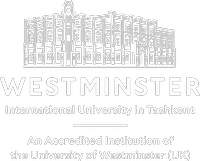
Full-time PhD student (2021-2023)
dgapparova@wiut.uz
Education / Academic qualification:
- 09/1999 – 06/2002: Lyceum under the University of World Economy and Diplomacy, Tashkent, Uzbekistan, Diploma of Academic Lyceum with honours
- 09/2002 – 07/2007: University of World Economy and Diplomacy, Tashkent, Uzbekistan, Bachelor of Science (B.Sc.) in International Economic Relations (with honours)
- 09 /2010 – 07 / 2011: Goethe University, Frankfurt am Main, Germany, Guest student, Master’s Program in Pedagogics for Economists (Attendance at the Lectures in Macroeconomics, Microeconomics, Financial Economics, Pedagogics for Economists)
- 09/2013 – 07/2015: University of World Economy and Diplomacy, Tashkent, Uzbekistan, Master of Science (M.Sc.) in World Economy (with honours)
Employment:
- 09/2015 – 08/2020: University of World Economy and Diplomacy, Tashkent, Uzbekistan, Chair of International Trade and Investment , Teaching/Research assistant, Modules: International Financial Markets, Investment Project Management
- 09/2020 – present: Westminster International University in Tashkent, Uzbekistan, PhD Student, Econometrics and Statistics
Expertise:
- Quantitative methods (particularly statistics and econometrics)
- International economics (particularly, trade, international investments, international financial markets)
Doctoral Project:
Econometric modeling of the export potential of the Republic of Uzbekistan
The title of the dissertation is “Econometric modeling of the export potential of the Republic of Uzbekistan”.
Determination of economic factors affecting formation of exports in Uzbekistan, and their reflection in econometric models of analysis and forecasting of exports has both scientific and practical significance. The aim of the thesis is to build several econometric models of export and their empirical verification on the data of foreign trade of Uzbekistan. These models, after proper econometric validation, can serve as tools to take into account the effects of export on Uzbekistan’s growth. Econometric modeling of international trade was carried out by J. Tinbergen, J. Anderson, E. Winkop and others. They developed so-called gravity approach to the analysis and forecasts of export. The widespread use of dynamic econometric models is due to the discoveries in econometrics by R. Engle, C. Granger, D. Hendry and S. Johansen. Subsequently, C. Sims used vector autoregression in econometric analysis and gave impetus to the further development of macroeconometrics. The IMF has developed models for forecasting exports and imports, which include the main factors affecting the volume of exports and imports. At the same time, certain aspects of econometric forecasting of exports in developing countries, in which the export of primary goods prevails, remain insufficiently developed.
The research looks at the set of indicators of the export of the Republic of Uzbekistan, and tries to study the factors affecting them. The research tasks include the following: (i) to systematize the theoretical tools of economics in the analysis of international trade and export policy, (ii) to review a foreign practice in the field of export-oriented policy, (iii) to systematize the econometric tools used for the analysis of export potential and policy, (iv) study of the dynamics and structure of exports in the Republic of Uzbekistan with the identification of their most significant factors, (v) construction of econometric models of export of the Republic of Uzbekistan, (vi) development of a methodology for empirical verification of econometric models of export, (vii) analysis of the scale of the reaction of export volumes to changes in various factors, (viii) development of recommendations for the practical use of the estimated models for assessing the consequences of economic policy decisions. The practical results of the research are expected to be the scenario forecasts of changes in export volume and potential depending on changes in various parameters and the recommendations for the government on the effective formation of export-oriented policy. The values of elasticities obtained in the research allow predicting changes in export volumes based on changes in various parameters. The specified elasticities can be used both in other studies and to analyze the consequences of various trade and economic decisions
Publications:
- Methods for Analyzing and Assessing the Impact of FDI on Economic Development: A Brief Overview // Proceedings of the Republican scientific-practical conference "Improving the methodological framework for the analysis and forecasting of world economic development", UWED, 2014, pp.179-181.
- The determinants of the FDI flows: an econometric analysis on the example of a sample from 26 countries // Journal "Young Scientist", No. 10 (90), 2015.
- Review of the theory of foreign direct investment based on microeconomic approaches // Proceedings of the Republican scientific-theoretical conference "Modernization of the national economy: economic law", Tashkent State University, Tashkent, 2015, p. 34-37.
- Regional and Sectoral Distribution of Global FDI Inflows // Proceedings of the Republican Conference "Modernization of the National Economy: Economy and Law", Tashkent State University, Tashkent, 2015, p. 38-41.
- Factors affecting an inflow of foreign direct investment in landlocked countries // Republican conference "On the way to modernization of the economy of Uzbekistan: legal and economic reforms", Tashkent State University, Tashkent, 2015, p.356-357.
- Trends in global FDI inflows and their inflows into the economy of the Republic of Uzbekistan // Proceedings of the Scientific-practical conference "Issues of introduction of contemporary management techniques in public administration", Academy of Public Administration, Tashkent, 2016.
- Trends in FDI inflows into the economy of the Republic of Uzbekistan and their sectoral distribution // Proceedings of the Republican scientific and practical conference "Modernization of the economy and the development of foreign economic relations of the Republic of Uzbekistan: approaches, trends and prospects", UWED, Tashkent, January 17, 2017.
- The determinants of the current trends in global FDI flows // Journal "Business Bulletin", No. 8, 2017.
- World trends in the formation of FDI flows: the role of regional integration processes (a primer of ASEAN) // Monograph, Saarbrücken: Lambert Academic Publishing, 2017. - 121 p.
- Regional integration process: ASEAN experience // Journal "Society and Management", №2, 2018, p. 155-161.
- External factors of export: classification on the basis of econometric studies review // Proceedings of the International Conference “Enhancing of Contemporary Business Management, Economics, Innovation Technologies, and Social Sciences: A Viewpoint on Research and Practice”, Tashkent Institute of Finance, Tashkent, May, 24, 2021, pp. 351-355.
Conference Participations, Scientific Talks:
- A scientific talk on the topic: “A foreign experience of implementing export orientation policy: a case of the Republic of Korea”, XIII Forum of Economists of Uzbekistan, Institute for Forecasting and Macroeconomic Research under the Ministry of Economic Development and Poverty Reduction of the Republic of Uzbekistan, October 5, 2021
- A scientific talk on the topic: “External factors of exports: classification based on a review of econometric studies”, The International Conference on “Enhancing of Contemporary Business Management, Economics, Innovation Technologies, and Social Sciences: a Viewpoint on Research and Practice", Tashkent Institute of Finance, May 24, 2021




